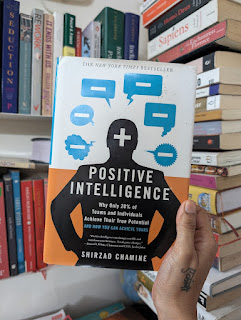Book Review- Positive Intelligence by Shirzad Chamine
This self-help book can be succinctly summarized as "repackaging old wine in a new bottle".
We Indians have a solid philosophical background and, although, the terms used in this book are new, the basic theme behind them is an age-old Hindu concept which, I guess, is not new for Indian reader.
The book basically says to trust to inner voice/gut (“sage”, a term used in the book) when kama (Desire/Lust), Krodha (Anger), Lobha (Greed), Maya (Ego), Moha (Attachment), Matsarya (Jealousy) and Alasya (laziness) -aka “saboteurs”, a term used in the book, start controlling mann; as Mann (“judge”, a term used in the book) later start dictating the life decisions if left uncontrolled.
The book does a great job of showing how to shift from a "Saboteur mode" to a "Sage mode" mindset. It explains how to apply positive intelligence and resilience in everyday life using relatable case studies and practical exercises.
The book outlines different spheres of intelligence:
A. Intellectually intelligent people, who possess skills, knowledge, and cognitive abilities;
B. Emotionally intelligent people, who are able to build trust, navigate team dynamics, and build solid relationships with others;
C. Positively Intelligent people who are able to activate the sage voice and weaken the different saboteurs of their mind. These individuals are able to make their mind work for them, rather than against them.
To become a more positive, intelligent person, I found these strategies helpful (however, to understand them correctly, the book reading is required)-
The book basically says to trust to inner voice/gut (“sage”, a term used in the book) when kama (Desire/Lust), Krodha (Anger), Lobha (Greed), Maya (Ego), Moha (Attachment), Matsarya (Jealousy) and Alasya (laziness) -aka “saboteurs”, a term used in the book, start controlling mann; as Mann (“judge”, a term used in the book) later start dictating the life decisions if left uncontrolled.
The book does a great job of showing how to shift from a "Saboteur mode" to a "Sage mode" mindset. It explains how to apply positive intelligence and resilience in everyday life using relatable case studies and practical exercises.
The book outlines different spheres of intelligence:
A. Intellectually intelligent people, who possess skills, knowledge, and cognitive abilities;
B. Emotionally intelligent people, who are able to build trust, navigate team dynamics, and build solid relationships with others;
C. Positively Intelligent people who are able to activate the sage voice and weaken the different saboteurs of their mind. These individuals are able to make their mind work for them, rather than against them.
To become a more positive, intelligent person, I found these strategies helpful (however, to understand them correctly, the book reading is required)-
a. Weaken Saboteurs (by labelling them)
b. Strengthen Sage (seeing the big picture, remembering three gifts from the situation, etc)
c. Strengthening the Mental Fitness Muscles (by taking pauses in life)
Overall, this book is read-able!!
Quotes from the book-
“Most feelings of stress, anxiety, frustration, disappointment, regret, and guilt are the direct results of judging yourself, others, situations, or outcomes.”
“even though you made a mistake, you are still a wonderful person.”
“the “when” for peace and happiness is actually now, regardless of the circumstances of your work or personal life.”
“began having more success once he finally stopped believing that his happiness depended on his success.”
“The 80-20 Rule of Conflict: It is a rare conflict in which anyone is 100 percent at fault. As a rule of thumb, I tell people in a conflict to remember that they are at least 20 percent at fault. Encourage people to shift from trying to prove the other person’s 80 percent fault to discovering the 20 percent they are contributing.”



Just by reading the review, a spark is generated to read this book. Superb. Pls get me link to purchase this book.
ReplyDeleteHi. Thanks for reading. The book is available on online portals. I got mine through a friend.
DeleteGautam Buddha when enlightened said- We are what we think. All that we are arises with our thoughts. With our thoughts we make the world.
ReplyDeleteSo observing our thoughts is a key to the world I guess.